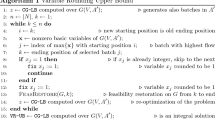Abstract
Parallel-batch machine problems arise in numerous manufacturing settings from semiconductor manufacturing to printing. They have recently been addressed in constraint programming (CP) via the combination of the novel sequenceEDD global constraint with the existing pack constraint to form the current state-of-the-art approach. In this paper, we present a detailed analysis of the problem and derivation of a number of properties that are exploited in a novel mixed integer programming (MIP) model for the problem. Our empirical results demonstrate that the new model is able to outperform the CP model across a range of standard benchmark problems. Further investigation shows that the new MIP formulation improves on the existing formulation primarily by producing a much smaller model and enabling high quality primal solutions to be found very quickly.
Access this chapter
Tax calculation will be finalised at checkout
Purchases are for personal use only
Preview
Unable to display preview. Download preview PDF.
Similar content being viewed by others
References
Hooker, J.: A hybrid method for planning and scheduling. Constraints 10, 385–401 (2005)
Beck, J.C., Feng, T.K., Watson, J.P.: Combining constraint programming and local search for job-shop scheduling. INFORMS Journal on Computing 23(1), 1–14 (2011)
Tran, T.T., Beck, J.C.: Logic-based benders decomposition for alternative resource scheduling with sequence-dependent setups. In: Proceedings of the Twentieth European Conference on Artificial Intelligence (ECAI 2012), pp. 774–779 (2012)
Malapert, A., Guéret, C., Rousseau, L.M.: A constraint programming approach for a batch processing problem with non-identical job sizes. European Journal of Operational Research 221, 533–545 (2012)
Schutt, A., Feydy, T., Stuckey, P.J., Wallace, M.: Solving RCPSP/max by lazy clause generation. Journal of Scheduling 16(3), 273–289 (2013)
Baptiste, P., Le Pape, C.: Constraint propagation and decomposition techniques for highly disjunctive and highly cumulative project scheduling problems. Constraints 5(1-2), 119–139 (2000)
Baptiste, P., Le Pape, C., Nuijten, W.: Constraint-based Scheduling. Kluwer Academic Publishers (2001)
Vilím, P.: Edge finding filtering algorithm for discrete cumulative resources in O(kn log n). In: Gent, I.P. (ed.) CP 2009. LNCS, vol. 5732, pp. 802–816. Springer, Heidelberg (2009)
Freuder, E.C.: In pursuit of the holy grail. Constraints 2, 57–61 (1997)
Heinz, S., Ku, W.-Y., Beck, J.C.: Recent improvements using constraint integer programming for resource allocation and scheduling. In: Gomes, C., Sellmann, M. (eds.) CPAIOR 2013. LNCS, vol. 7874, pp. 12–27. Springer, Heidelberg (2013)
Daste, D., Gueret, C., Lahlou, C.: A branch-and-price algorithm to minimize the maximum lateness on a batch processing machine. In: Proceedings of the 11th International Workshop on Project Management and Scheduling (PMS), Istanbul, Turkey, pp. 64–69 (2008)
Lee, C.Y., Uzsoy, R., Martin-Vega, L.A.: Efficient algorithms for scheduling semiconductor burn-in operations. Oper. Res. 40(4), 764–775 (1992)
Grossmann, I.E.: Mixed-integer optimization techniques for the design and scheduling of batch processes. Technical Report Paper 203, Carnegie Mellon University Engineering Design Research Center and Department of Chemical Engineering (1992)
Brucker, P., Gladky, A., Hoogeveen, H., Kovalyov, M.Y., Potts, C.N., Tautenhahn, T., van de Velde, S.L.: Scheduling a batching machine. Journal of Scheduling 1(1), 31–54 (1998)
Pinedo, M.L.: Scheduling: Theory, Algorithms, and Systems, 2nd edn. Prentice-Hall (2003)
Shaw, P.: A constraint for bin packing. In: Wallace, M. (ed.) CP 2004. LNCS, vol. 3258, pp. 648–662. Springer, Heidelberg (2004)
Azizoglu, M., Webster, S.: Scheduling a batch processing machine with non-identical job sizes. International Journal of Production Research 38(10), 2173–2184 (2000)
Dupont, L., Dhaenens-Flipo, C.: Minimizing the makespan on a batch machine with non-identical job sizes: An exact procedure. Computers & Operations Research 29(7), 807–819 (2002)
Sabouni, M.Y., Jolai, F.: Optimal methods for batch processing problem with makespan and maximum lateness objectives. Applied Mathematical Modelling 34(2), 314–324 (2010)
Kashan, A.H., Karimi, B., Ghomi, S.M.T.F.: A note on minimizing makespan on a single batch processing machine with nonidentical job sizes. Theoretical Computer Science 410(27-29), 2754–2758 (2009)
Ozturk, O., Espinouse, M.L., Mascolo, M.D., Gouin, A.: Makespan minimisation on parallel batch processing machines with non-identical job sizes and release dates. International Journal of Production Research 50(20), 6022–6035 (2012)
IBM ILOG: User’s manual for cplex (2013)
Ilog, I.: Cplex optimization suite 12.5 (2013)
Choco Team: Choco: An open source java constraint programming library. version 2.1.5 (2013)
Shaw, P.: Using constraint programming and local search methods to solve vehicle routing problems. In: Maher, M.J., Puget, J.-F. (eds.) CP 1998. LNCS, vol. 1520, pp. 417–431. Springer, Heidelberg (1998)
Author information
Authors and Affiliations
Editor information
Editors and Affiliations
Rights and permissions
Copyright information
© 2014 Springer International Publishing Switzerland
About this paper
Cite this paper
Kosch, S., Beck, J.C. (2014). A New MIP Model for Parallel-Batch Scheduling with Non-identical Job Sizes. In: Simonis, H. (eds) Integration of AI and OR Techniques in Constraint Programming. CPAIOR 2014. Lecture Notes in Computer Science, vol 8451. Springer, Cham. https://doi.org/10.1007/978-3-319-07046-9_5
Download citation
DOI: https://doi.org/10.1007/978-3-319-07046-9_5
Publisher Name: Springer, Cham
Print ISBN: 978-3-319-07045-2
Online ISBN: 978-3-319-07046-9
eBook Packages: Computer ScienceComputer Science (R0)




